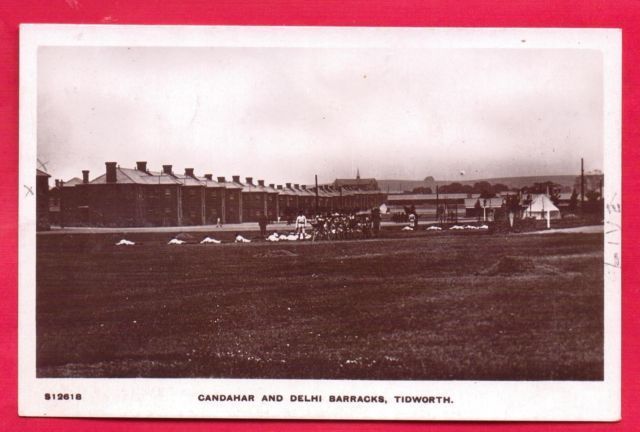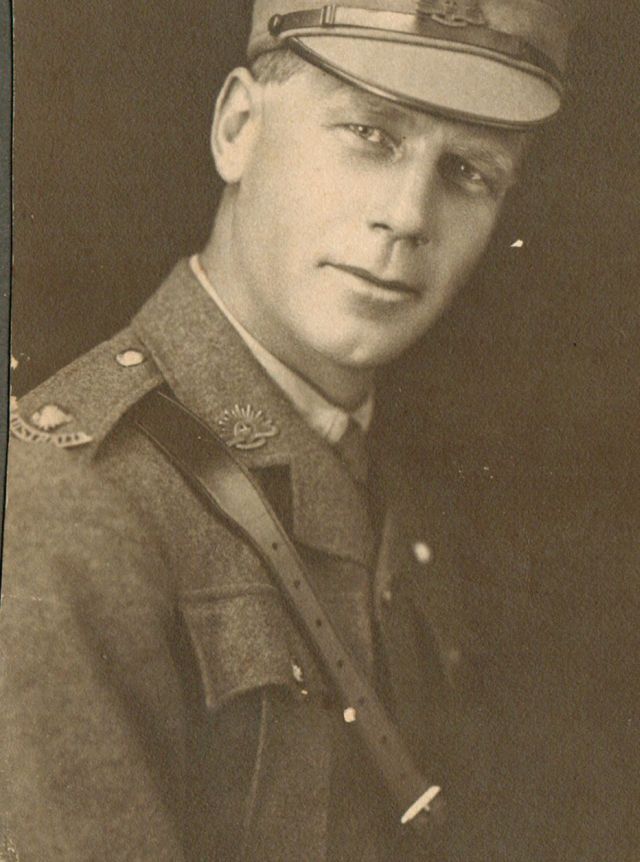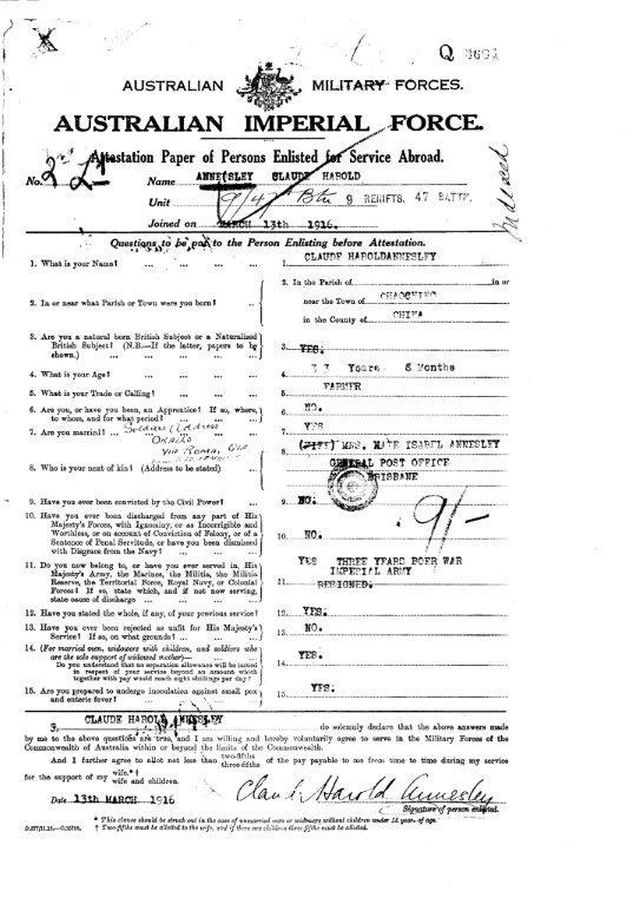He joined firstly as a Private from 14th March 1916 to 8th June 1916.
He was then promoted to Corporal
Then Sergeant until 30th September 1916
Then he was promoted to 2nd Lieutenant from 1st October 1916
He attended the Citizen Force Camps Training Centre, Charleville and Toowoomba October 1916
Then 9/47th Battalion from 29th November 1916.
Where did Katie and Valerie go? Claude was training from March to November 1916 and didn’t leave Australia until
January 1917
He embarked from Sydney on the “Ayreshire” 24th January 1917 and arrived at Devonport UK 12th April 1917.
He undertook training at Tidworth, obtaining the level of distinguished at the school of Musketry.
He had a fair knowledge of the Lewis Gun.
From June 1917 to 9th August 1917 he was at the School of Instructors Candashar Barracks Tidworth.
He left on 9th August 197 from Southampton to France.
On 10th August he joined the depot from England at Havre (on the Normandy coast)
On 24th August he marched out to Unit again in Havre
On 1st September 1917 he was taken on strength to Belgium
On 1st November 1917 he was a Lieutenant
On 16th November 1917 he was ordered to be Bombing Officer with the 4th Australian Division.
On 26th November 1917 He was granted leave due to a casualty in the field
On 23rd February 1918 He returned from Leave
On 2nd March 1918 he was detached for duty at x Corps School in France
On 16th March 1918 He was placed on Reg. Seconded List invalided
On 13th March 1918 He was reported as a casualty at Boulogne (Northern France near Belgium)
On 18th March 1918 He was reported D.A.H. at Wandsworth
On 4th April 1918 he was transferred to Cobham Hall in Wandsworth
On 14th Mary he transferred from Cobham Hall and discharged to Sutton Veny.
On 15th May 1918 he was M/I from Headquarters London
Over the next few weeks he was subject to a number medicals from a variety of doctors.
On 11th June 1918 he was placed on the Supry List for return to Australia.
On 20th August 1918 he was at Hurdcott
On 23rd September 1918 due to medical condition we was returned to Australia.
On 29th November 1918 he left England on the Runic.
On 26th November 1918 he disembarked at Melbourne for Brisbane
On 12th December 1918 his appointment was terminated.
Claude had an interesting time during the war.
From his service notes, he was only on the Western Front on active duty for a very short period of time.
The battles around Ypres were brutal, and one has to wonder at the extreme courage that servicemen took with so many lives lost. Dotted throughout the region are mass
graves, signifying the sacrifice that young people made. It would not be the place that anyone would want to be.
Claude reported for sick leave for a lot of time.
The following reports from Officers provide an insight into Claude and his unwillingness to continue on the fighting front.
Aus/C89/8. 13.3.18
To C.O. 47th Battn. I beg to report that I examined Lieut Annesley at Dijou Comp on 22.2.18. My opinion then was that, although he was in an anemic condition, he was in a fit condition
to remain in the Field. Advising him at the same time, to receive temporary treatment from me. Sgd J.D. Farrell Capt R.M.O. 47th Bn.
A letter from Lt Col. A. P. Imlay, the Commanding Officer of the 47th Btn. A.I.F. Written in the field
To Headquarters, 12th A.E.Bde
Attached re Lieut Annesley. C.H. 47th Bn forwarded for your information.
This officer was sent to X.Corps School at Boeschere on 24th February 1918 after having previously been passed fit for service by the R.M.O. Since he has joined the Bn this officer has
done a tour in the line and I understand it is his intention by going to an outside M.O. to avoid further service. Is it possible for him to be boarded by A.I.F. Medical Officers with a view to
some service being obtained from him.
He enlisted in Queensland 14.3.16, joined Battalion 27.8.18 and so far, in my opinion, the expense entailed in his military education has been wasted if he succeeds in his desire to return
to Australia.
In the field 14.3.18
H.Q. 4th Aust. Division
I strongly recommend the action referred to above. Signed J. Gellibrand. Brig. Gen. Commdg. 12th A.I.Bde 15.3.18
D.A.C.,A.I.F. 47/1/78 dated 23rd March 1918
Sir, I beg to inform you that yesterday I was evacuated from the X Corps School and sent to No 63 C.C.S. suffering from “D.A.H”. I am to be sent to the Base tomorrow. I will keep you informed of an important
move that happens to me in the future.
I have the honour to be Sir, Your obedient servant. Sgd C.H. Annesley
17th March from Major General S.G. Sinclair-McLaren, requesting that C.H. Annesley be medially boarded.
20th March from Col T.H. Dodds, requesting that C.H. Annesley be specially brought before an A.I.F. Medical Board
26th March from Major J.W. Donnelly as Lieut Annesley was transferred to England on 18th instant on the hospital ship “St Denis” kindly arrange that be brought before an A.I.F. Medical Board
3rd April 1918 Lt A. Charlesworth advised that he had been Unit G.S. 2 mos, Unfit H.S. (Act. Duty with troops) 6 weeks, Unfit H.S. (Sedentary emp. Only) 4 weeks. Admitted Cobham.
Several letters follow then on 12th April 1918 Colonel T.H.D. advises - In view of medical report on the above named officer, will you please take action to ensure that he immediately rejoins his unit in the Field
on being fit for General Service.
On 29th May 1918 from Headquarters in Tidworth, Lt. Col. S. Bruggy advised that Lieut Annesley was boarded to 20.5.18. “Unfit GS. 1 month fit H.S.”, further board 20.6.18. On the latter date if marked G.S. his
name will be submitted to War Office for early passage overseas.
Letters follow dated 28th May, 26th June and 14th July which indicated that the he had been before the medical board and was unfit.
On 10th July Brig. General T. Dodds summarised his appearance at the medical boards April May and June. And added….
I am to inform you that, taking into consideration the report submitted on this Officer by his Battalion Commander and R.M.O. it has been decided that, if he is not fit for general service at his next board, he will be returned to Australia for
termination of his appointment in the A.I.F. In view of his short service in the Field it is not considered advisable to retain him indefinitely on home service in England!
On 8th August Lt Col Knox advised headquarters to arrange his return to Australia and for termination of appointment with A.I.F.
The medical reports indicate that his Malaria which he contacted in Africa had caused his disability, coupled with stress and strain
One report mentioned his urine was coffee coloured, and others note that he has arteriosclerosis and exhausted.
“He has marked cardiac irregularity and definitely thickened arteries and is unlikely to be of any use on the front”
His Medical Report on an Invalid, notes that he is a grazier. And that his disability is malaria, which commenced in Africa. He gets attacks of malarial fever in a cold climate.* (*Medical opinion may differ 100 years later.)
On 7th August, 1918 Miss Evelyn Clarke of 57 Pitt Street Sydney writes to the AIF requesting any information about Lt Annesley as she had not been able to
contact him.
On 12th August 1918 the Major at Officer I/C. Base Records writes to her stating that the latest report received here concerning Lieutenant C.H. Annesley was
to the effect that he had been discharged on 14th May 1918 from hospital (where he had been previously admitted suffering from Disordered Action of the Heart)
to No. 1 Convalescent Depot. He then advises her to direct mail to the 47th Battalion.
On 8th May 1919, after Claude has been terminated from the A.I.F., Evelyn Clarke again writes to the Officer in Charge of the Base Records, as she had been
unable to get in contact with him for some time and mail had been returned.
On 13th May 1919 the Major writes another letter to Miss. E. Clarke, The Army write and tell her the only address they have is c/- GPO Brisbane, but if she
contact the Staff Officer for Invalid and Returned Soldiers at Victoria Barracks, he may be able to provide her with a more definite address.
On 21st February 1921, Mr Arthur Elwin writes to the Army from 2 Castle St Dover, advising he had sent a letter on 20th September last to his client Mr Claude
Harold Annesley, addressed “Bowen” North Queensland, but that it had been returned. He too was seeking his address.
On 7th April, 1921 the Major wrote to Arthur B. Elwin Esq. advising that the address they had in records was c/- GPO. He also writes to the DFO 1st Military
District, that if ex-officer Annesley applies for his gratuity, to inform him of his address
On 16th April the office advises the address is c/- Orallo via Roma.
On 30th April, Major writes again to Arthur Elwin and provides the address of Orallo.
Two people looking for Claude. Perhaps Evelyn was a nurse he met in England? But who was Arthur Elwin?
�




